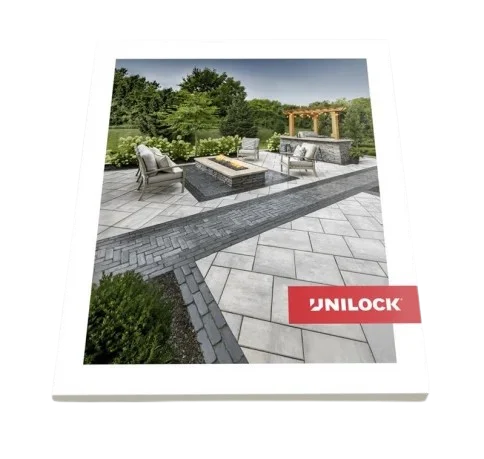How to Use Environmental Product Declarations for Your Hardscape Business

When Unilock introduced permeable paving to North America in the early 1990s, we began reducing cement usage by incorporating supplementary cementitious materials. Today, cement is a major contributor to global carbon emissions, and urgent action is needed to meet the 2030 climate goals, as set out in the Paris Agreement.
In the context of environmental sustainability, making informed product choices is crucial to achieving climate-positive objectives. This is where Environmental Product Declarations play a pivotal role.
What is an Environmental Product Declaration?
An Environmental Product Declaration, or EPD for short, is a document that narrates the environmental impact or performance of a product over its lifetime.
Why were EPDs created?
We introduced EPDs to provide complete transparency regarding the environmental impact of our paving stones, slabs, and retaining wall products. These EPDs serve as a pivotal tool, enabling comprehensive life-cycle analysis. In the current market, where direct comparisons are challenging due to a limited pool of resources, EPDs showcase our leadership in environmental stewardship and sustainability. However, we anticipate changes in the landscape over time.
By using these declarations, you and your clients can make informed decisions about the products you choose for outdoor projects, recognizing their broader impact on the surrounding built environment.
How do EPDs measure performance and impact?
EPDs utilize the measurement of embodied carbon in carbon dioxide equivalents (e-CO2) to assess a product’s performance and impact. The carbon footprint of a product encompasses the total greenhouse gas emissions generated throughout its life cycle, from raw material extraction to disposal. A higher embodied carbon value indicates a greater environmental impact of the product, however it is quite a bit more complex than simply looking at the value alone.
How to Select Eco-Friendly Products for Clients Using EPD Numbers
Your clients may not fully grasp the environmental impact of their outdoor spaces. As a hardscape professional, it’s crucial to educate them about eco-friendly product options and the concept of embodied carbon. Understanding not only the level of embodied carbon in your chosen products but the net value of the system in which it is being built empowers you to make environmentally responsible choices. This not only benefits the environment but also elevates your hardscape business, showcasing your commitment to sustainability and environmental responsibility.
It’s also important to consider how these elements will align with existing features in your client’s outdoor space. For instance, when selecting materials for an outdoor pathway or driveway, take into account surrounding greenery, such as trees, shrubs, or flowerbeds, and incorporate sustainable practices like composting. These practices and systems can lead to carbon dioxide absorption, also known as sinks, ultimately reducing your project’s carbon impact. Given that carbon dioxide contributes to climate change, such considerations are particularly crucial.
The Transformative Impact of Permeable Pavers
In today’s environmentally conscious world, permeable pavers stand out as one of the most carbon neutral systems when compared to traditional paving products. Although the paver and other materials will have an embodied carbon value, the system creates a carbon sink which counteracts the value. Not only do they reduce your carbon footprint, but they also offer numerous advantages for both the environment and your clients. Permeable pavers are designed with special spacer bars that enable water to infiltrate the subsoil, reducing the risk of puddling or runoff on the surface. Beyond averting flooding and filtering contaminants, permeable pavers play a crucial role in protecting our environment by preventing pollutants from entering nearby storm drains and ultimately reaching local rivers and ponds. This helps preserve aquatic ecosystems and improve overall water quality.
Beyond their eco-friendliness, permeable pavers offer a wide range of styles, textures, and colors that can elevate the aesthetics and functionality of outdoor spaces. Your clients will appreciate not only the environmental benefits but also the opportunity to customize their projects with these versatile products.
How Unilock intends to use EPDs to reduce our carbon footprint
There are many changes happening throughout the industry, and today we have a baseline against which we can measure our future improvements. Understanding the results from our EPDs allows Unilock to develop and implement effective strategies to reduce our environmental impact while we enhance our product collections over time. To learn more about our commitment to sustainability, visit our Sustainability page.







